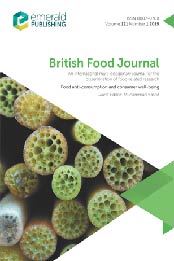
- Title:Food Anti-Consumption and Consumer Well-being
- Author:
- Pages: 241
- Publisher (Publication Date): 2019
- Language: English
- ISBN-10: 1838676546
- Download File Format:PDF
There are 14 papers included in this special issue. First paper, “Exploring inside the box: a cross cultural examination of stimuli affecting fast food addiction”, authored by Hania and colleagues is a cross-cultural study and highlights the role of personal, social, and demographic factors affecting food addiction. Second paper, “Social media analysis of anti-consumption in Turkey”, authored by Khan and colleagues aims to examine consumer perceptions of food anti-consumption in a cultural context of Turkey. Third paper, “Factors influencing Turkish parents’ intentions towards anti-consumption of junk food”, authored by Yarimoglu and colleagues is aimed at investigating role of attitude, norms, and behavioural control to determine junk food anti-consumption among children in a Turkish context. Fourth paper, “Eating habits of polish university students depending on the direction of studies and gender”, authored by Tarnowska and colleague aims to examine the binge eating habits of university students, intersecting the findings based on gender. Fifth paper, “The impact of self-congruity (symbolic and functional) on brand hate: A study based on Self-congruity theory”, authored by Tahir and colleagues investigates the impact of symbolic and functional incongruity to study brand hate, supported empirically to test the hypotheses. Sixth paper, “Farmer Behavior and Perception regarding food waste and unsold food”, authored by Alessandro and colleagues aims to study the farmers’ attitude towards food waste Behavior. Seventh paper, “Consumers’ anti-consumption behavior toward organic food purchase: an analysis using SEM”, authored by Mohammad Ali and colleagues highlights the role of Theory of Planned Behaviour (TPB) based antecedents of organic food consumption. The eighth paper, “Is Anti-consumption Driving Meat Consumption Changes in Australia?” authored by Malek and colleagues aims to determine the factors which can increase or decrease the meat consumption in Australia. The ninth paper, “Organic Shoppers’ involvement in organic foods: Self and identity”, authored by Yun-Hee and colleagues aims to understand consumer identity issues related to organic food satisfaction and the resultant word-of-mouth. . Tenth paper, “Preaching to the middle of the Road: Strategic differences in persuasive appeals for meat anti-consumption”, authored by Catherine and colleagues explores the strategic differences in marketing communication tactics used by vegan and humane brands. The eleventh paper, “Brand Hate: The Case of Starbucks in France” authored by Glyn and colleagues aims to explore the antecedents and consequences of negative affect in the food sector. By employing a mixed-method design, data was collected from 324 business school students. The Twelfth paper, “Nutritional traffic light and self-regulatory consumption: the role of emotions”, authored by Isabel and colleagues investigated the impact of nutritional traffic lights to reduce consumers’ intention of unhealthy food consumption. The thirteenth paper, “The role of religious motivation in an international consumer boycott”, authored by Nazlida and colleagues tests the role of intrinsic religious motivation to boycott US based brands. The fourteenth paper, “Model construction of engagement and outcomes in consumers food life: evidence from chain stores customer”, authored by Saman and colleagues signify the role of consumer lifestyles and personality to examine their satisfaction and loyalty.
![Eating Behavior and Obesity: Behavioral Economics Strategies for Health Professionals 1st Edition by Dr. Shahram Heshmat PhD [0826106218, Format: PDF] 0826106218](https://cookebooks.info/wp-content/uploads/2019/02/0826106218.jpg)
![The Sociology of Food: Eating and the Place of Food in Society by Jean-Pierre Poulain [1472586212, Format: PDF] 1472586212](https://cookebooks.info/wp-content/uploads/2019/05/1472586212.jpg)
![Consumer-Driven Innovation in Food and Personal Care Products by S R Jaeger, Hal MacFie [PDF: 1845695674] Consumer-Driven Innovation in Food and Personal Care Products by S R Jaeger, Hal MacFie](https://cookebooks.info/wp-content/uploads/2020/03/1845695674.jpg)
![Food and Media by Jonatan Leer [EPUB: 1472439686] Food and Media by Jonatan Leer [EPUB: 1472439686]](https://cookebooks.info/wp-content/uploads/2022/06/1472439686.jpg)
![Cooking and Coping Among the Cacti: Diet, Nutrition and Available Income in Northwestern Mexico by Roberta D. Baer [9056995758, Format: PDF] 9056995758](https://cookebooks.info/wp-content/uploads/2018/10/9056995758.jpg)
![The Microbiology of Safe Food 3rd Edition by Stephen J. Forsythe [EPUB: 1119405017] The Microbiology of Safe Food 3rd Edition by Stephen J. Forsythe](https://cookebooks.info/wp-content/uploads/2020/11/1119405017.jpg)